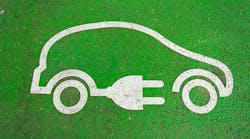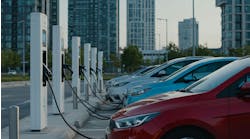As a national build-out of an electric vehicle (EV) charging infrastructure continues, it’s becoming clear that the primary role of electrical contractors – putting the electrical components and connections in place – may be the least of the challenges.
More vexing, perhaps, will be the effort to make the charging stations and charging experience consistently user-friendly and reliable, features that will be essential for moving the needle on EV adoption, which could be slowed by concerns like range anxiety and reticence to deal with vehicle-charging hassles.
Two new research reports from Juniper Research looking at the state of the global EV charging infrastructure point to emerging problems with a lack of standardization owing to variances in charging point location, ownership, management, operations, services, and capabilities.
In EV Charging: Key Opportunities, Regional Analysis & Market Forecasts 2023-2027, Juniper dissects some of the hurdles that an EV charging station-build out is facing traced to “fragmentation in charging networks” that are restricting adoption. There’s an imbalance in siting chargers – they’re abundant in urban areas and sparse elsewhere; there’s little continuity in apps and cards needed to activate charging; and few standards are in place related to charging capability – the time it takes to charge a vehicle and a match between the type of EV and the charger.
“EV charging networks must simplify access and work with local authorities to roll out chargers to a wider range of locations, or the EV market will struggle to accelerate,” Juniper states in a press release announcing the report.
Juniper’s other report, a whitepaper entitled “Why EV Charging Infrastructure is Surging,” analyzes the multiple structural and organizational elements at play in the EV charging universe, highlighting the challenges facing each and making inferences about the difficulty that poses for improving standardization. Identifying four basic market structure elements – the EV user; the charging service; the charging provider; and the hardware provider – the paper observes that “the EV charging market is highly complex, featuring many different elements.” The presence of different players, host locations, and business models for bringing EV charging services to the market spawns the fragmentation the report says could slow and complicate the deployment of EVs.
“Despite some improvements, the global EV charging market remains fragmented,” the report notes. “The issue is likely to continue to improve over the coming years, with fragmentation being unsustainable in the long term.”
Despite formidable structural challenges, Juniper predicts the number of plug-in vehicles on the road globally will surge past 137 million globally by 2027, up from 49 million in 2023, implying that market fragmentation and other logistical challenges will continue to be worked out. And it estimates the total value of the global EV charging market climbing from $66 billion in 2023 to more than $300 billion by 2027, with North America accounting for about 60% of the total.
New administration push on standards
In the U.S., the Biden administration has announced new steps to try to create a more user-friendly, reliable, and accessible EV charging network. In a Feb. 15 announcement, the White House detailed an action plan to address EV charging disparities spanning “connector types, payment methods, data privacy, speed and power of chargers, reliability, and the overall user experience.”
For new charging stations that are federally funded, including those funded through the new National Electric Vehicle Infrastructure (NEVI) program, the Federal Highway Administration will adopt new standards addressing key concerns of predictability and reliability. They include mandating consistent plug types, power levels and a minimum number of chargers that support drivers’ fast-charging needs; 97% uptime reliability; publicly accessible data on locations, price, availability and accessibility of chargers through mapping applications; a common, single method of identification that replaces multiple apps and accounts used to charge; and compatibility with future capabilities in the works that would make the charging experience similar to the gasoline-fueling experience.
“A recent survey of EV users reported frustration with chargers that are too slow, too crowded, or that just don’t work,” the White House announcement reads. “Under FHWA’s new standards, we are fixing this.”
The new standards stand to apply to a half-million federally funded chargers that could be in place by 2030, courtesy of administration directives through programs like NEVI and others.
In addition to announcing the new standards addressing the user experience, the White House outlined an array of other actions aimed at building out a national EV charging network that will put more EVs on the road. Notable ones include requirements that federally-funded chargers be primarily produced in the U.S. by 2024; funding for seven projects to develop innovative medium- and heavy-duty EV charging and hydrogen corridor infrastructure plans serving millions of Americans across 23 states; and funding to communities to help deploy publicly accessible charging/alternative fueling infrastructure in communities across the country, including at schools, grocery stores, parks, libraries, and apartment complexes.
Tom Zind is an independent analyst and freelance writer based in Lees Summit, Mo. He can be reached at [email protected].



